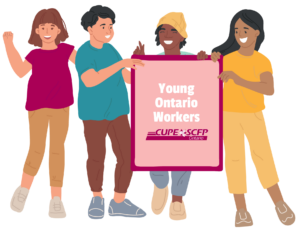Who are Young Workers?
The CUPE Young Ontario Workers’ Committee is made up of activists under 35 years of age. The committee believes that the strengths that young workers possess are an integral part of our movement. We strive to enhance the skills of young workers as activists, strengthen their leadership skills, protect and advocate for their rights as workers and ensure the voices of young workers are heard.
Our Committee’s mission is to reach out to young members through local, provincial and national initiatives to ensure that CUPE Ontario has an active, vibrant and educated young worker membership.
How do I get involved?
On the Committee
In every even numbered year the Young Workers committee is elected at the Young Workers Conference. There are 7 committee member positions.
The CUPE Ontario Young Worker Chair position is nominated, and elected, at the Young Worker caucus at the CUPE Ontario Convention, in the even numbered years.
The Northern Ontario Young Worker representative position is elected in odd number years at the CUPE Ontario Convention during the Northern Ontario Caucus. This person is nominated, and elected, by young worker delegates from Northern Ontario.
At Your Local
– Approach your locals executive and ask if there is a young worker committee within your local, at an area labour council or a local CUPE council. If there is find out when this committee meets and reach out to the chair of that committee.
– Ask the local executive about mentorship for stewarding roles or education you may be able to access through the local, area CUPE council or area labour council.
– Attend monthly General Membership meetings. If you are unsure when these are contact a local executive member or steward.
– Ask a local executive member or steward for a copy of your locals collective agreement and local bylaws.
– Keep in contact with your local executive and shop stewards. Feel free to ask any questions you may have.
– Reach out to any of the members of the CUPE Ontario Young Worker committee.
What Is A Union?
A union is an organized group of workers who unite to make decisions about conditions affecting their work. Unions strive to bring economic justice and social justice in workplaces across the province, country and world wide.
Unions help members provide the highest level of service by ensuring they are safe and healthy at work, and that they get fair pay and benefits for the services they provide.
CUPE advocates for workers who deliver the public services people depend on. By advocating for better public services, such as improvements to public health care and to the Canada Pension Plan, CUPE is able to improve local communities and the lives all Canadians who benefit from better working conditions, wages and benefits.
Unions…
- Are a democratic organization of workers who have united to improve overall quality of life.
- Representative of workers in negotiations with employers.
- Ensure workers have a say in their wages, benefits, safety, and health and well-being.
- Give workers a strong voice in the workplace.
Allies :
FAQs :
What is quorum?
The minimum number of members required to hold a meeting.
What is Collective Bargaining?
Collective bargaining, covers a variety of subjects and involves hundreds of thousands of members in the process. Representatives of labor and management negotiate over wages and benefits, hours, working conditions and much more. The settlement reached is spelled out in a written document or contract. The contract normally contains a grievance procedure to settle disputes. It is the job of the union to enforce the contract on behalf of the members.
What are the benefits of being in a union?
Unions are important because they help set the standards for education, skill levels, wages, working conditions, and quality of life for workers. Union-negotiated wages and benefits are generally superior to what non-union workers receive.
Workers who are paid well and enjoy job security can afford to pay taxes to support the growth of public services like schools, roads, clean water, police services, electricity and health care. In this regard, even people who have never belonged to a union benefit from the existence of good union jobs in their communities.
Upcoming Events :
- Racial Justice & Human Rights Conference – November 24 – 27
- Stay tuned for webinar series (equity , violence ,mental health and housing )
Success Stories :
- Resolution to have a standing conference
- 49 delegates at 2024 conference – doubling attendance from 2022
- Resolution to increase age to 35
- Past committee members hosting cupe cast podcast
- Very diverse committee – representing areas all over the province, and all equity deserving groups
- Young workers are more prominently represented in leadership positions
– WILD program
– Ontario executive board
– Committees
– National staff
COVID-19 :
Photos :
Photos can be found here.













